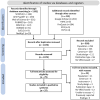Virtual Reality and Serious Videogame-Based Instruments for Assessing Spatial Navigation in Alzheimer's Disease: A Systematic Review of Psychometric Properties
- PMID: 38403731
- PMCID: PMC11965194
- DOI: 10.1007/s11065-024-09633-7
Virtual Reality and Serious Videogame-Based Instruments for Assessing Spatial Navigation in Alzheimer's Disease: A Systematic Review of Psychometric Properties
Abstract
Over the past decade, research using virtual reality and serious game-based instruments for assessing spatial navigation and spatial memory in at-risk and AD populations has risen. We systematically reviewed the literature since 2012 to identify and evaluate the methodological quality and risk of bias in the analyses of the psychometric properties of VRSG-based instruments. The search was conducted primarily in July-December 2022 and updated in November 2023 in eight major databases. The quality of instrument development and study design were analyzed in all studies. Measurement properties were defined and analyzed according to COSMIN guidelines. A total of 1078 unique records were screened, and following selection criteria, thirty-seven studies were analyzed. From these studies, 30 instruments were identified. Construct and criterion validity were the most reported measurement properties, while structural validity and internal consistency evidence were the least reported. Nineteen studies were deemed very good in construct validity, whereas 11 studies reporting diagnostic accuracy were deemed very good in quality. Limitations regarding theoretical framework and research design requirements were found in most of the studies. VRSG-based instruments are valuable additions to the current diagnostic toolkit for AD. Further research is required to establish the psychometric performance and clinical utility of VRSG-based instruments, particularly the instrument development, content validity, and diagnostic accuracy for preclinical AD screening scenarios. This review provides a straightforward synthesis of the state of the art of VRSG-based instruments and suggests future directions for research.
Keywords: Alzheimer disease; COSMIN; Digital neuropsychology; Psychometric properties; Serious games; Systematic review; Virtual reality.
© 2024. The Author(s).
Conflict of interest statement
Declarations. Ethics Approval: Not applicable. Consent to Participate: Not applicable. Consent for Publication: Not applicable. Conflict of Interest: The authors declare no competing interests.
Figures
Similar articles
-
A systematic review of tools designed for teacher proxy-report of children's physical literacy or constituting elements.Int J Behav Nutr Phys Act. 2021 Oct 8;18(1):131. doi: 10.1186/s12966-021-01162-3. Int J Behav Nutr Phys Act. 2021. PMID: 34620185 Free PMC article.
-
The measurement of collaboration within healthcare settings: a systematic review of measurement properties of instruments.JBI Database System Rev Implement Rep. 2016 Apr;14(4):138-97. doi: 10.11124/JBISRIR-2016-2159. JBI Database System Rev Implement Rep. 2016. PMID: 27532315
-
Smartphone- and Tablet-Based Tools to Assess Cognition in Individuals With Preclinical Alzheimer Disease and Mild Cognitive Impairment: Scoping Review.J Med Internet Res. 2025 May 27;27:e65297. doi: 10.2196/65297. J Med Internet Res. 2025. PMID: 40424609 Free PMC article.
-
Psychometric properties for instruments used to measure core outcomes for provoked vestibulodynia: a systematic review.J Sex Med. 2025 Jun 29;22(7):1253-1274. doi: 10.1093/jsxmed/qdaf120. J Sex Med. 2025. PMID: 40444585
-
Drugs for preventing postoperative nausea and vomiting in adults after general anaesthesia: a network meta-analysis.Cochrane Database Syst Rev. 2020 Oct 19;10(10):CD012859. doi: 10.1002/14651858.CD012859.pub2. Cochrane Database Syst Rev. 2020. PMID: 33075160 Free PMC article.
Cited by
-
Digital Ergonomics of NavegApp, a Novel Serious Game for Spatial Cognition Assessment: Content Validity and Usability Study.JMIR Serious Games. 2025 Apr 2;13:e66167. doi: 10.2196/66167. JMIR Serious Games. 2025. PMID: 40173437 Free PMC article.
-
Preclinical Cognitive Markers of Alzheimer Disease and Early Diagnosis Using Virtual Reality and Artificial Intelligence: Literature Review.JMIR Med Inform. 2025 Jan 28;13:e62914. doi: 10.2196/62914. JMIR Med Inform. 2025. PMID: 39881486 Free PMC article. Review.
-
RADAR-AD: assessment of multiple remote monitoring technologies for early detection of Alzheimer's disease.Alzheimers Res Ther. 2025 Jan 27;17(1):29. doi: 10.1186/s13195-025-01675-0. Alzheimers Res Ther. 2025. PMID: 39865315 Free PMC article.
References
-
- Alsbury-Nealy, K., Wang, H., Howarth, C., Gordienko, A., Schlichting, M. L., & Duncan, K. D. (2021). OpenMaze: An open-source toolbox for creating virtual navigation experiments. Behavior Research Methods,54(3), 1374–1387. 10.3758/s13428-021-01664-9 - PubMed
-
- Alzheimer’s Association. (2023). 2023 Alzheimer’s disease facts and figures,19(4), 1598–1695. 10.1002/alz.13016 - PubMed
Publication types
MeSH terms
LinkOut - more resources
Full Text Sources
Medical
Miscellaneous


